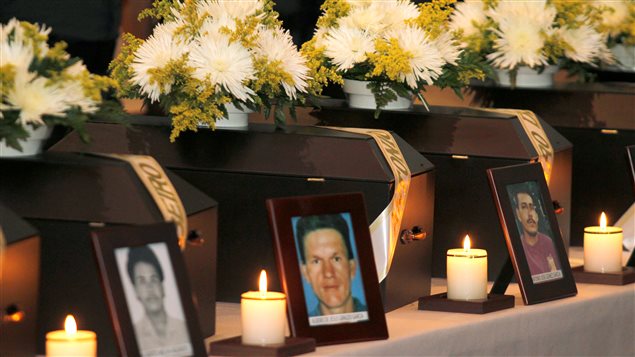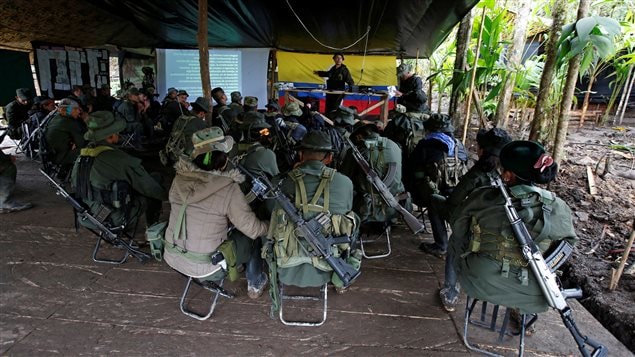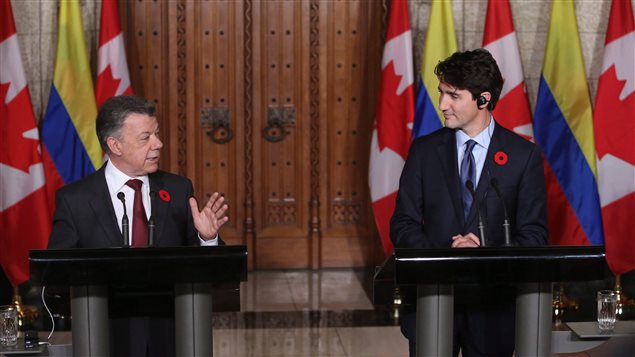As Canada pushes ahead with closer economic ties with Colombia, civil society groups are calling on Ottawa to use its growing influence with Bogota to urge Colombian authorities to speed up the implementation of key provisions of its peace accord with leftist rebels and address the endemic problem of political violence in the country.
While Colombian President Juan Manuel Santos needs to be commended for finding a negotiated settlement to the armed conflict with the FARC rebel group and seeking a similar peace agreement with another guerrilla group, Colombian authorities need to do a lot more before they can claim that Colombia is open to business, said Bill Fairbairn, program manager for Latin America at Inter Pares, a Canadian social justice organization that is part of the Americas Policy Group (APG), an umbrella group of several NGOs.
“We’ve seen that there has been an alarming wave of new attacks directed at social leaders and human rights defenders in Colombia,” Fairbairn said, speaking on behalf of multiple Canadian NGOs such as Amnesty International, Nobel Women’s Initiative, MiningWatch, and many others that make up the APG.
“And we’re also hearing that the Colombian government has been moving very slowly in implementing the peace accords that were signed last year and ratified by Congress.”
Every four days in Colombia a human rights activist, a trade unionist, an environmental or peace activist is murdered, Fairbairn said.
“We are really concerned about the ongoing killings of social leaders and Colombian human rights defenders,” Fairbairn said.

A report by a Colombian government shows that 300 community organizations across the country are at risk, he said.
“It means that they are receiving chilling death threats or they are subjected to other forms of stigmatization, attack or intimidation,” Fairbairn said.
Inter Pares has obtained copies of two recent death threats issued by various right-wing paramilitary groups to human rights campaigners and Indigenous leaders, Fairbairn said. The death threats included detailed daily routines of the intended targets, showing that they have been under close surveillance for some time, he said.
“Signing the peace agreement is the necessary first step but real peace in Colombia is going to mean addressing the history of political exclusion, huge inequalities and social conditions that are at the root of the armed conflict in Colombia,” Fairbairn said.
“The Canadian government needs to give a full wholehearted support to the peace process, both the one with the FARC and the one with ELN, especially on encouraging the Colombian government to live up to its commitments.”
Colombian officials need to be held to account, he said
“Canada is committed to protecting and promoting human rights around the world and to building lasting and just peace for the people of Colombia,” said Brianne Maxwell, a spokesperson for Global Affairs.
She said this week’s visit by President Santos to Canada provided the opportunity to discuss, among other issues, the implementation of the peace process.
“Canada recognizes the advances achieved by Colombia in strengthening their approach to human rights, but we also understand that many significant challenges remain in the post-conflict context, and in the on-going implementation of the peace process,” said Maxwell.

While overall violence in Colombia has decreased with the peace process, Canadian officials say they are concerned that targeted violence against human rights defenders and community leaders has continued to increase over the last few years, with marked spikes in 2016 and 2017.
The violence has also been concentrated in rural areas, which were at the epicentre of the decades-long civil war, they said.
Canada supports the work of the Office of the United Nations High Commissioner for Human Rights (OHCHR) in Colombia as part of the Trudeau government’s peace support package, through the Peace and Stabilization Operations Program, officials said.
In addition, Canada and Colombia hold regular political and human rights consultations where human rights issues and cooperation are discussed, officials said. The last consultation took place in Ottawa on April 18 of this year, they said.
At the end of May, the Canadian and Dutch embassies organized a meeting between ambassadors and Colombia’s attorney general to discuss the status of investigations into killings and threats against human rights defenders and community and social leaders, officials said.
In May 2010, Canada and Colombia signed the Agreement Concerning Annual Reports on Human Rights and Free Trade between Canada and the Republic of Colombia, officials said. This agreement obliges both countries to produce and table in their national legislature, an annual report analyzing the impact on human rights of actions taken under the Free Trade Agreement during the previous calendar year.







For reasons beyond our control, and for an undetermined period of time, our comment section is now closed. However, our social networks remain open to your contributions.